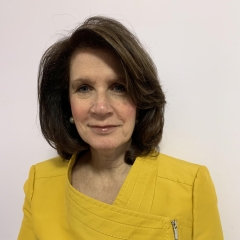Scholar Spotlight: Robin Price
Article

Robin Price was a lawyer. She was a teacher, an art program director, and is bilingual in French. Now, she can say she was a GSS Fordham 2020 Graduate and Children and Families Scholar. This past year, Robin interned at the Adolescent Unit at New York Presbyterian Hospital, helping children who struggle with anxiety, depression, and self-harm. When offered this field internship opportunity, she jumped at the chance.
Before the scholarship, Robin had four years of professional experience working with adolescents through the program “Girl Talk” at Irvington High School. A mentoring program, “Girl Talk” paired Irvington High’s female students with their younger, middle-school peers, to discuss some of the trials and tribulations that occur in those uncomfortable teenage hallways. The high school students would then take their turns as mentees, coming to Robin and her contemporaries for advice.
“It was a great program,” she said. “For the most part, adolescents don’t want to speak to parents. They just don’t. So, the way we could get to these young girls was via these high school girls, who had [previously] gone through many of those situations.”
But how did she fare at NY Presbyterian Hospital? Robin believes the key to her one-on-one success with the adolescents is through her discovery of the child’s passions, and the ultimate encouragement of self-esteem.
“No matter how smart, athletic, or talented you are, if you don’t believe in yourself, the talents go to waste,” she said. “I try to discover with them, what are their particular talents? And I encourage them to follow those passions, follow those talents.”
The importance of confidence is something Robin learned at a young age. One doesn’t survive litigation law—or growing up the only girl with three brothers—without self-esteem.
“My father would say to me, ‘Robin, if you don’t have confidence, you have nothing’,” she said. “And it’s something that is part of the way in which I live my life.”
However, things don’t always go so smoothly, even with a gentle approach. The hardships these children have gone through make it all the more difficult for them to think of anything positive about themselves, let alone voice these things to a stranger. In these circumstances, Robin tried other outlets for connection, whether that be through art, or, in one particular case, the French language.
“I had one patient who was terrific with language, and she mentioned she was taking French,” Robin said. “So, I started speaking to her in French, and she loved it. Any time I interacted with her, I would teach her some French. So, I made a connection that way.”
Her research also taught Robin more about variables that aren’t so easy to find a connection in, such as self-harm.
“I see it, and it’s rampant,” she said. “It’s something I knew very little about when I started, because on a personal level, I can’t relate. Understanding that and doing the research in that area is another benefit I’m going to get out of this experience.”
We all have at least one memory from adolescence that can remind us how difficult this period in life can be. Robin knows these kids need resilience to follow their passions. The Children and Families Scholarship allowed her to help adolescents find resilience through the gateway of self-assurance.
“They [the adolescents] are trying to figure out who they are. Some kids feel like they need to conform, others feel like they’re outsiders and don’t belong,” she said. “I think the best way to build resilience in kids is to have that strong sense of self.”
At home, Robin is a mother of two daughters. And when asked if the kids at New York Presbyterian saw her as a mothering figure, she raised her eyebrows and laughed.
“I really don’t know how they see me,” she said. “I have no idea. But I can say for the most part, when they see me, they seem to be happy to see me. They greet me with smiles.”